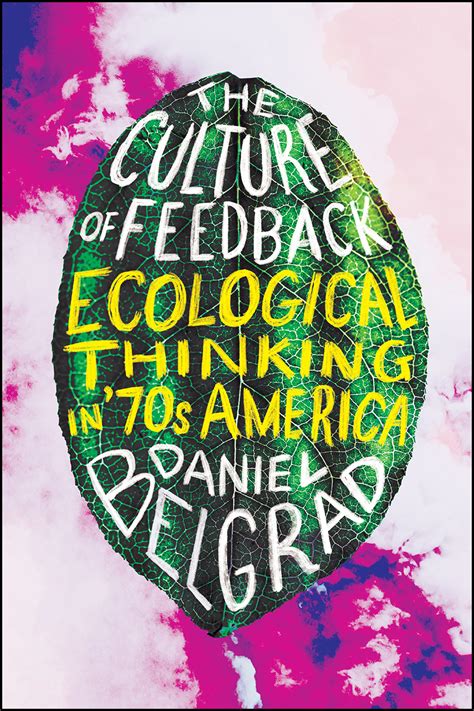First pages of book chapters and introductions are formatted differently than interior pages. For instance, at the top of the first page of the introduction to Daniel Belgrad’s The Culture of Feedback: Ecological Thinking in Seventies America (University of Chicago Press, 2018), are a few extra inches blank space. Below that is the word, “Introduction,” in large type, and then in a smaller, special type, an epigram—several lines of lyric from a 1972 song by Funkadelic. At this point, there isn’t much room left on the page, but Belgrad makes it count with these two brief paragraphs:
We speak casually of improving a course of action by getting some feedback, as if that were the most natural thing in the world. But the idea of feedback itself has a history. During the Second World War, “feedback” developed as a term to refer to the dynamics of self- regulating mechanical systems, which correct their actions by “feeding” some effects “back” into the system as input to influence later actions. Due to the ability of such systems to self- correct, or “learn,” they could be considered intelligent.
Conversely, systems theory, which developed to describe how such systems worked, came to define intelligence itself as the ability to self- correct in response to feedback. Redefining intelligence this way—not as a uniquely human faculty produced by consciousness, but as the property of a system governed by feedback loops—eventuated in new ways of thinking about the varieties of intelligence found in nature. This is what I mean by ecological thinking.
I responded to these sentences with both joy and consternation. How many words had I committed to paper, how many lines and paragraphs had I sweated through, and never stated the case and its relevance so clearly? That was the consternation. The joy was mostly in that last sentence. With his articulation of “ecological thinking,” Belgrad confirmed the basic insight that had guided my own work. I was all in. But then again, he probably had me at Funkadelic.

All in, yes, but not without at least one arched eyebrow. The ideas of anthropologist and systems theorist Gregory Bateson, the central figure in my own book, are prominent in The Culture of Feedback, and two scholars, looking at the some of the same evidence, can’t be expected to agree in every particular.
Later in the introduction, Belgrade quotes a line from Bateson’s essay, “Social Planning and the Concept of Deutero-Learning,” which Bateson gave at the Second Symposium on Science, Philosophy and Religion in Their Relation to the Democratic Way of Life in New York in September of 1941. The question on the table at that symposium was to what degree the knowledge created by the social sciences should be applied to the fight against Nazi Germany, especially in regard to using that knowledge to fashion effective pro-democratic, anti-fascist propaganda.
Some argued that if the Western democracies wanted to defeat the fascists, they ought to use every tool in their bag. But both Bateson and Margaret Mead, then married, advised that the reckless use of anthropological learning for something as instrumental as defeating an enemy could undermine the very values they wished to defend. Rather than embracing the premise that ends justified means, Mead proposed that ends and means be integrated, so that democratic values were present at every moment in the process of working toward the goal. Bateson restated Mead’s proposal this way: “that we discard purpose in order to achieve our purpose.”
This is the quote Belgrad uses, and it winds up carrying significant weight in the book overall. The paradoxical character of the quote, and especially the way it represents a willingness to cede the desire to control natural processes in order to cultivate a healthier alignment with them, “would become” Belgrad writes, “a central tenet of the culture of feedback” (12).
Yes, something like this idea would become a tenet in thinking ecologically. But that wasn’t what Bateson was really after when he wrote it. For him, the construction was mostly rhetorical. By restating Mead’s earlier proposal to integrate means and ends with a phrase that owed more to poetry than science, Bateson wanted his listeners to sit up and take notice. Having gained their attention, he then delivered a largely technical contemplation of how difficult it would actually be, “to discard purpose to achieve purpose,” especially for a society whose commitment to “purpose and instrumentality” was both stronger and deeper than its commitment to self-government and the human rights of individuals.[1]
It’s not that Belgrad’s use of the Bateson quote isn’t perfectly legitimate. “Social Planning and Deutero-Learning” is an important work in the development of Bateson’s thought. That makes it important, too, to the development of what Belgrad calls the culture of feedback—and important to ecological thought, generally. That’s how significant Bateson is to this history of ideas. Both Belgrad and myself give attention to the essay in our respective books and quote some of the same lines, including the one in question. The difference between how we do so says something about the practice of scholarship.
Here’s how I see that difference. In regard to the historical evidence—Bateson’s essay, in this case—Belgrad stands at a further distance away. That position allows him to telescope time and make a broader claim. My stance is close in. The culture of feedback doesn’t yet exist. The closer-in position allows for insights not only into the essay’s main ideas but also into the relationship between Mead and Bateson, their difference in styles, the concerns and attitudes that drew them together, the concerns and attitudes that were pulling them apart. The story becomes one of persons as well as of ideas.
Having made that observation, let me hasten back to unreserved praise for The Culture of Feedback. For one thing, I admire how readable it is. Data from the philosophical, the political and the aesthetic sit side by side in these pages, with nary a creak in the prose. It’s thoroughly researched and comes with all the expected academic apparatus, yet the book reads weightlessly. Belgrad’s claims are straightforward and clearly demonstrated.
In one chapter, for example, he shows how the ideas related to the culture of feedback were applied in a series of musical experiments. For these experimental artists, “music was a way of integrating sounds into a natural, open system, organized by feedback relations rather than having been put in order by the composer’s dictatorial authority” (111). Under the heading of what was sometimes called “acoustic ecology,” some sought to design music-making and listening processes that didn’t contain a blueprint of its outcome—that discarded purpose to achieve purpose, as it were. Involved in these experiments, too, were efforts to include input from the environment in the acts of composition, performance, and reception–input that was by its nature undetermined and ever-changing.
Before reading Belgrad, I was unaware of names such as Pauline Oliveros, Max Neuhaus, La Monte Young, Steve Reich, Terry Riley, and Charlemagne Palestine, but I was familiar with Brian Eno, who built on and incorporated a number of these concepts and methods in recordings with titles such as Music for Airports and Music for Films. With these and other recordings, Eno opened a pathway for what he called “ambient music” through the semi-popular to the mainstream.
 Belgrad’s chapter on experimental and ambient music made me dig out my copy of Eno’s first LP in this series, from 1975, called Discrete Music. On the back of the cover was an “operational diagram,” looking very similar to those that Donella Meadows used repeatedly in Thinking in Systems: A Primer. As Eno explains in the liner notes, the diagram shows how he fed “two simple and compatible melodic lines of different duration” into his recorder while continually feeding them back in the recorder on a delay loop. He didn’t know how it would all turn out but, after designing the process, became “an audience to the result.”
Belgrad’s chapter on experimental and ambient music made me dig out my copy of Eno’s first LP in this series, from 1975, called Discrete Music. On the back of the cover was an “operational diagram,” looking very similar to those that Donella Meadows used repeatedly in Thinking in Systems: A Primer. As Eno explains in the liner notes, the diagram shows how he fed “two simple and compatible melodic lines of different duration” into his recorder while continually feeding them back in the recorder on a delay loop. He didn’t know how it would all turn out but, after designing the process, became “an audience to the result.”
Interesting, too, is how Eno describes his motivation for these experiments as a personal disinclination to intervene: “It was a point of discipline to accept this passive role, and, for once, to ignore the tendency to play the artist by dabbling and interfering.” This brought to mind Heidegger’s concept of “releasement” (which I’ve written about recently on this blog), as an alternative to the usual active sort of intervention in response to an urgent need. Eno acts at the level of premise, rather than at the level of behaviors allowed within the scope of premise, one might say. He’s not writing or even playing music. He’s making change in what music is understood to be.
How marvelous to discover that music can be that, it turns out.
Ecological thinking encourages interventions like this in the economy and other fundamentals— especially the thinking done by degrowth and other postgrowth communities. These are present-day advocacies, but what they are talking about isn’t exactly new. I’ll conclude with a sentence from Belgrad that incorporates a quote from Ervin Laszlo’s 1972 book, Introduction to Systems Philosophy:
“The Western world tends to offer the values of affluence as the panacea for all social ills,” [Laszlo] observed; but this behavior had resulted in an unsustainable level of resource consumption. Therefore, now “progress must be redefined, and that means a new system of values.”
___________
[1] Gregory Bateson, Steps to an Ecology of Mind (Chicago: University of Chicago Press, 2000), 159-60.

0